【外研版】七上 Module5 Unit2 We start work at nine o'clock 第1课时 习题课件
文档属性
| 名称 | 【外研版】七上 Module5 Unit2 We start work at nine o'clock 第1课时 习题课件 |  | |
| 格式 | pptx | ||
| 文件大小 | 2.8MB | ||
| 资源类型 | 试卷 | ||
| 版本资源 | 外研版 | ||
| 科目 | 英语 | ||
| 更新时间 | 2021-12-07 09:24:32 | ||
图片预览

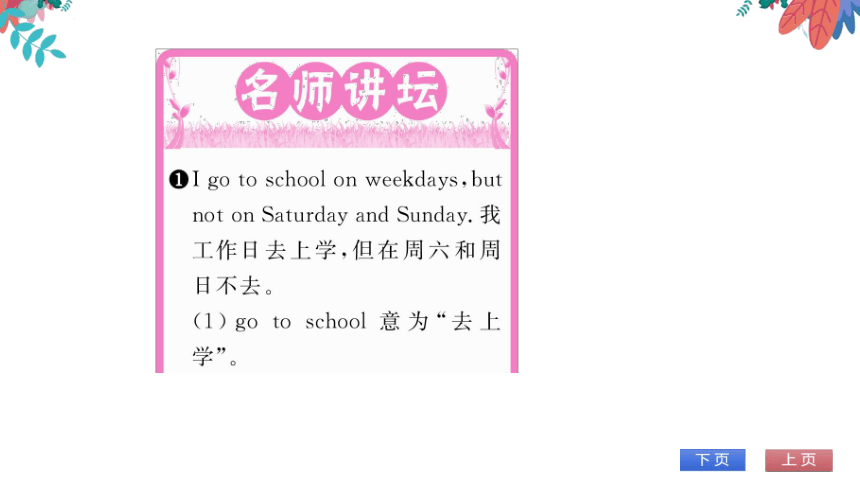
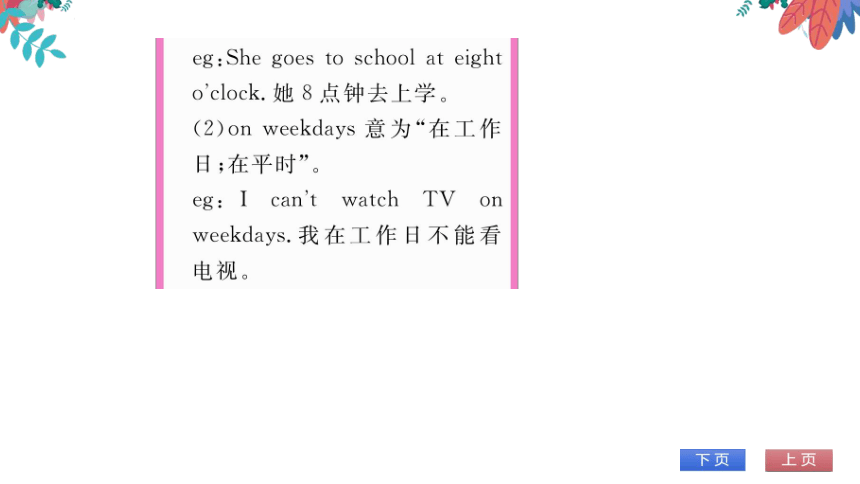
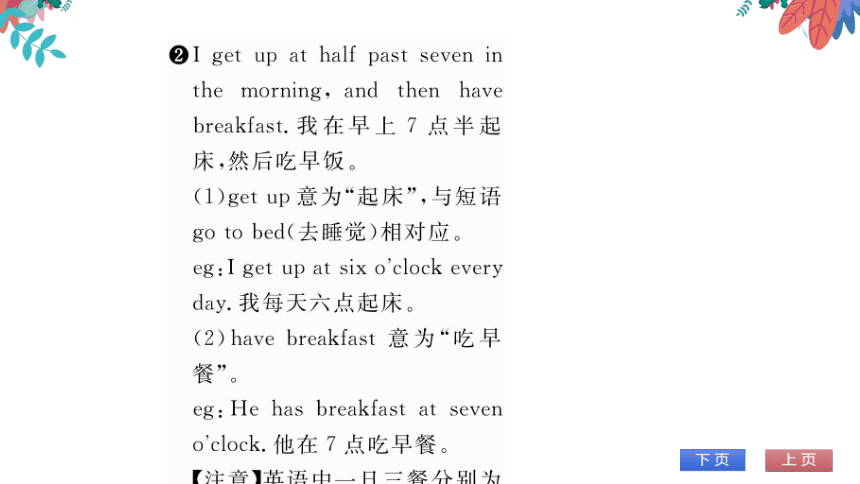
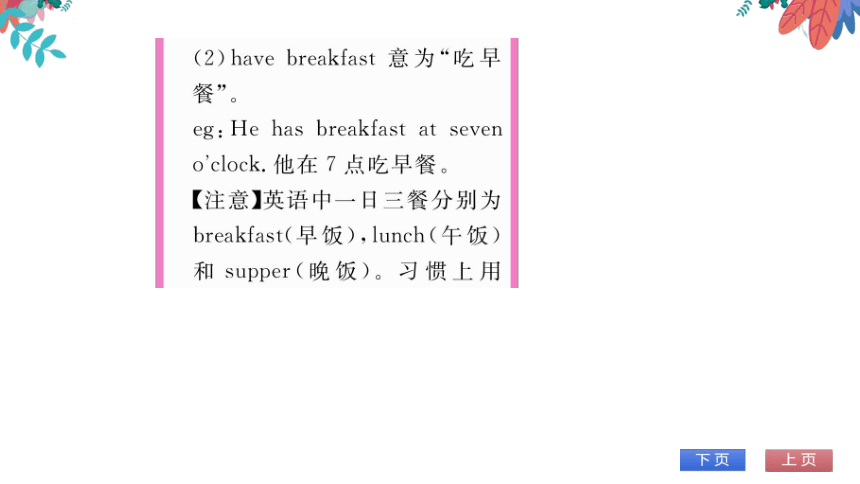
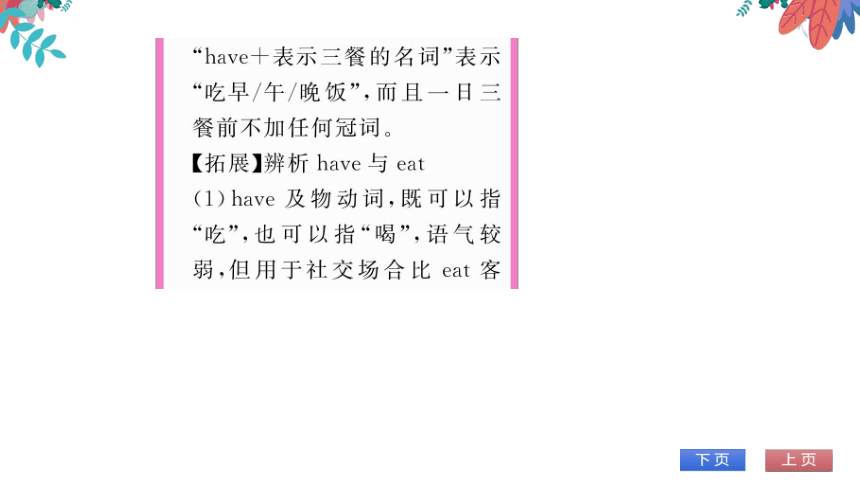
文档简介
(共13张PPT)
名师
i go to school on weekdays, but
not on saturday and sunday.
我
工作日去上学,但在周六和周
日不去。
(1) go to school意为“去上
eg She goes to school at eight
o' clock.她8点钟去上学。
(2) on weekdays意为“在工作
日;在平时”
eg
I cant watch tv on
weekdays.我在工作日不能看
电视
2I get up at half past seven in
the morning, and then have
breakfast.我在早上7点半起
床,然后吃早饭
(1) get up意为“起床”,与短语
go to bed(去睡觉)相对应。
eg i get up at six o'clock every
day.我每天六点起床。
(2) have breakfast意为“吃早
餐
eg He has breakfast at seven
o'clock.他在7点吃早餐
【注意】英语中一日三餐分别为
breakfast(早饭), lunch(午饭)
和
supper
(晚饭)。习惯上用
(2) have break fast意为“吃早
餐
eg
He has breakfast at seven
o'clock.他在7点吃早餐
【注意】英语中一日三餐分别为
breakfast(早饭), lunch(午饭)
和
supper
(晚饭)。习惯上用
“have+表示三餐的名词”表示
“吃早/午/晚饭”,而且一日
餐前不加任何冠词
拓展】辨析have与eat
(1)have及物动词,既可以指
“吃”,也可以指“喝”,语气较
弱,但用于社交场合比eat客
气。它后面还可跟meal和
餐名词,并且三餐名词前不加
冠词
eg: i dont want to have
supper.我不想吃晚饭
(2)eat既可作及物动词,也可
作不及物动词,多指“吃”,是日
常用语,使用很普遍。作“喝”
讲时,只表示“喝汤”。
eg My daughter eats fruit
every day
我女儿天天吃水果
根据句意及汉语提示完成单词
1.It’ s time to go to bed(床),Sam!
2. They live in a big he
ouse
(房子)
3.Iet' s go and watch(观看) the football match
4. The workers work on weekdays(工作日)
5. We are tired,let' s have a break(休息).
名师
i go to school on weekdays, but
not on saturday and sunday.
我
工作日去上学,但在周六和周
日不去。
(1) go to school意为“去上
eg She goes to school at eight
o' clock.她8点钟去上学。
(2) on weekdays意为“在工作
日;在平时”
eg
I cant watch tv on
weekdays.我在工作日不能看
电视
2I get up at half past seven in
the morning, and then have
breakfast.我在早上7点半起
床,然后吃早饭
(1) get up意为“起床”,与短语
go to bed(去睡觉)相对应。
eg i get up at six o'clock every
day.我每天六点起床。
(2) have breakfast意为“吃早
餐
eg He has breakfast at seven
o'clock.他在7点吃早餐
【注意】英语中一日三餐分别为
breakfast(早饭), lunch(午饭)
和
supper
(晚饭)。习惯上用
(2) have break fast意为“吃早
餐
eg
He has breakfast at seven
o'clock.他在7点吃早餐
【注意】英语中一日三餐分别为
breakfast(早饭), lunch(午饭)
和
supper
(晚饭)。习惯上用
“have+表示三餐的名词”表示
“吃早/午/晚饭”,而且一日
餐前不加任何冠词
拓展】辨析have与eat
(1)have及物动词,既可以指
“吃”,也可以指“喝”,语气较
弱,但用于社交场合比eat客
气。它后面还可跟meal和
餐名词,并且三餐名词前不加
冠词
eg: i dont want to have
supper.我不想吃晚饭
(2)eat既可作及物动词,也可
作不及物动词,多指“吃”,是日
常用语,使用很普遍。作“喝”
讲时,只表示“喝汤”。
eg My daughter eats fruit
every day
我女儿天天吃水果
根据句意及汉语提示完成单词
1.It’ s time to go to bed(床),Sam!
2. They live in a big he
ouse
(房子)
3.Iet' s go and watch(观看) the football match
4. The workers work on weekdays(工作日)
5. We are tired,let' s have a break(休息).
同课章节目录
- Starte
- Module 1 My teacher and my friends
- Module 2 My English lesson
- Module 3 My English book
- Module 4 My everyday life
- Module 1 My classmates
- Unit 1 Nice to meet you.
- Unit 2 I'm Wang Lingling and I'm thirteen years ol
- Unit 3 Language in use.
- Module 2 My family
- Unit 1 Is this your mum?
- Unit 2 These are my parents.
- Unit 3 Language in use.
- Module 3 My school
- Unit 1 There are thirty students in my class.
- Unit 2 The library is on the left of the playgroun
- Unit 3 Language in use.
- Module 4 Healthy food
- Unit 1 We've got lots of apples.
- Unit 2 Is your food and drink healthy?
- Unit 3 Language in use.
- Module 5 My school day
- Unit 1 I love history.
- Unit 2 We start work at nine o'clock.
- Unit 3 Language in use.
- Revision module A
- Module 6 A trip to the zoo
- Unit 1 Does it eat meat?
- Unit 2 The tiger lives in Asia.
- Unit 3 Language in use.
- Module 7 Computers
- Unit 1 How do I write my homework on the computer?
- Unit 2 When do you use a computer?
- Unit 3 Language in use.
- Module 8 Choosing presents
- Unit 1 I always like birthday parties.
- Unit 2 She often goes to concerts.
- Unit 3 Language in use.
- Module 9 People and places
- Unit 1 We're enjoying the school trip a lot.
- Unit 2 They're waiting for buses or trains.
- Unit 3 Language in use.
- Module 10 Spring Festival
- Unit 1 Are you getting ready for Spring Festival?
- Unit 2 My mother's cleaning our houses and sweepin
- Unit 3 Language in use.
- Revision module B
